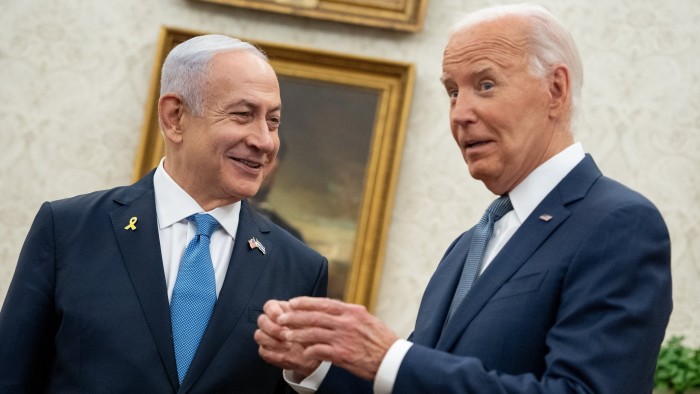
Unlock the White House Watch newsletter for free
Your guide to what the 2024 US election means for Washington and the world
The writer was US ambassador to Nato, 1993-98
With last Tuesday’s election in the US, President Joe Biden officially became a lame-duck, even though he still has a little over two months left in office. That is certainly true in domestic matters, where Congress would also need to act. Not so in foreign policy. Biden will retain all the powers of the presidency until high noon on January 20.
He could act, especially in the Middle East, where the president and other American political leaders have been previously constrained by domestic politics. Those constraints no longer apply, and Biden has virtually cost-free latitude to stop aligning US policy with the wishes of Israel’s Prime Minister Benjamin Netanyahu.
American sympathies were all with Israel after Hamas’s monstrous assault on October 7 2023; but Israel’s excesses in Gaza and now in Lebanon, killing and wounding thousands of civilians and turning Gaza into a wasteland, have turned support to widespread outrage. And the US has in effect become an unacknowledged co-belligerent because of Israel’s almost total dependence on American weaponry.
Biden faces a self-imposed deadline of November 13. On October 15, his secretaries of state and defence wrote to Israel’s security leaders that it would need to permit real humanitarian relief for Gaza within 30 days. The deadline was obviously chosen to fall beyond the US elections. The letter said: “Failure to demonstrate a sustained commitment to implementing and maintaining these [humanitarian] measures may have implications for US policy under . . . relevant US law.”
Biden is thus obliged to tell Israel to open borders to true humanitarian relief or to face some unstated consequences. To have any chance of success, these need to be a full cutting off of all US military and political support for Israel unless and until Netanyahu complies.
The US president could do the same when it comes to halting the conflict in Gaza and Lebanon, replacing them with US-led ongoing diplomacy. This is in American interests, but for Biden, who has almost always deferred to Netanyahu, it would almost surely be a bridge too far.
Geopolitically more important is Iran. Netanyahu has tried for years to drag the US into direct confrontation with the Islamic republic.
A key concern is Iran’s nuclear programme. As president, Barack Obama took care of that risk, at least for a decade, by negotiating the 2015 Joint Comprehensive Plan of Action. Iran would severely limit its nuclear programme (it did), and the US would lift many sanctions (it did). But in a supreme irony, Netanyahu vigorously opposed this step to reduce the risk of an Iranian bomb, including in two speeches to joint sessions of the US Congress (in 2015 and 2024.)
Just resuming efforts to address the nuclear crisis would mean achieving nothing under Biden’s presidency, and Netanyahu appears to be (almost certainly) looking to Trump to give him a green light on military action against Iran — and with a high chance that the US would get dragged in. Only a bold move — rejoining the JCPOA — has a chance of breaking the cycle and reducing Netanyahu’s opportunity to use Trump as enabler for Israeli military action against Iran.
Now it is argued that Iran is close to having enough fissile material for the bomb. And the world is waiting to see whether Israeli-Iranian hostilities will escalate, which could bring major risk of all-out regional war and threats to the west’s vital oil supplies. Biden could try to break this cycle with a stroke of a pen by rejoining the JCPOA and challenging Iran to reciprocate. The US has nothing to lose.
Perhaps it wouldn’t work. But at least Biden would show that, if the US is to risk military engagement in the region, he did everything possible while he still had time.

